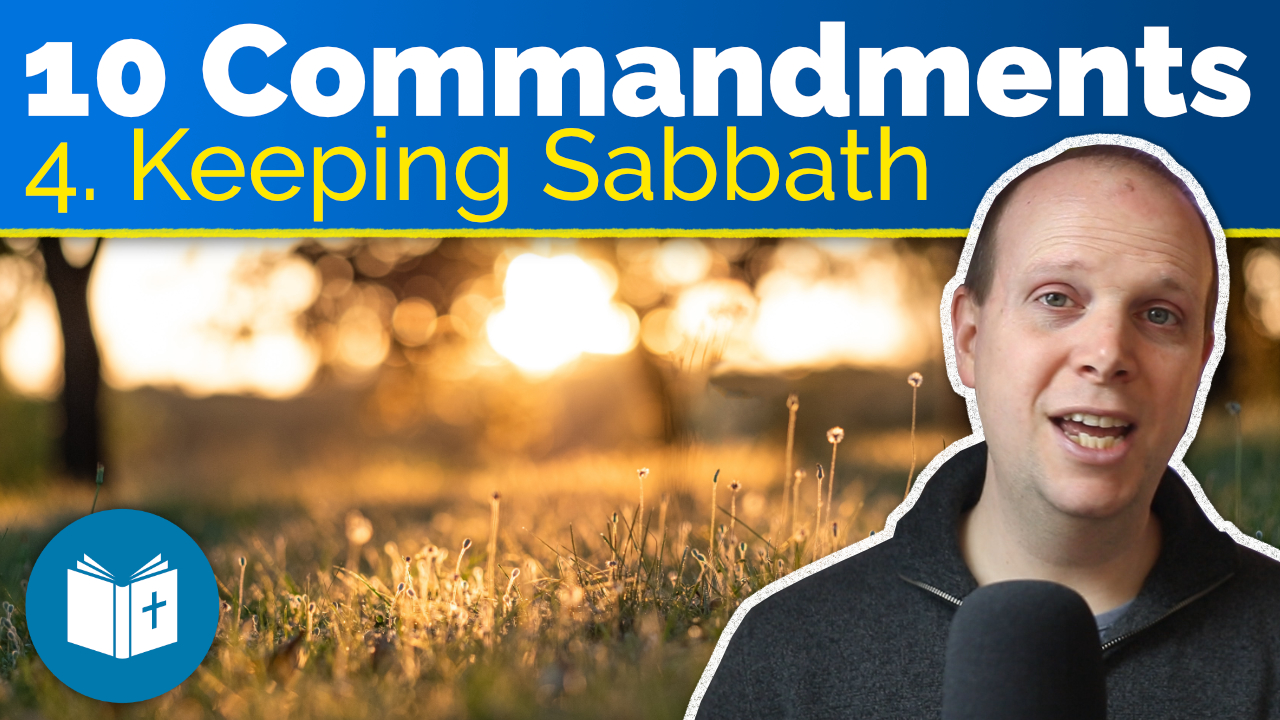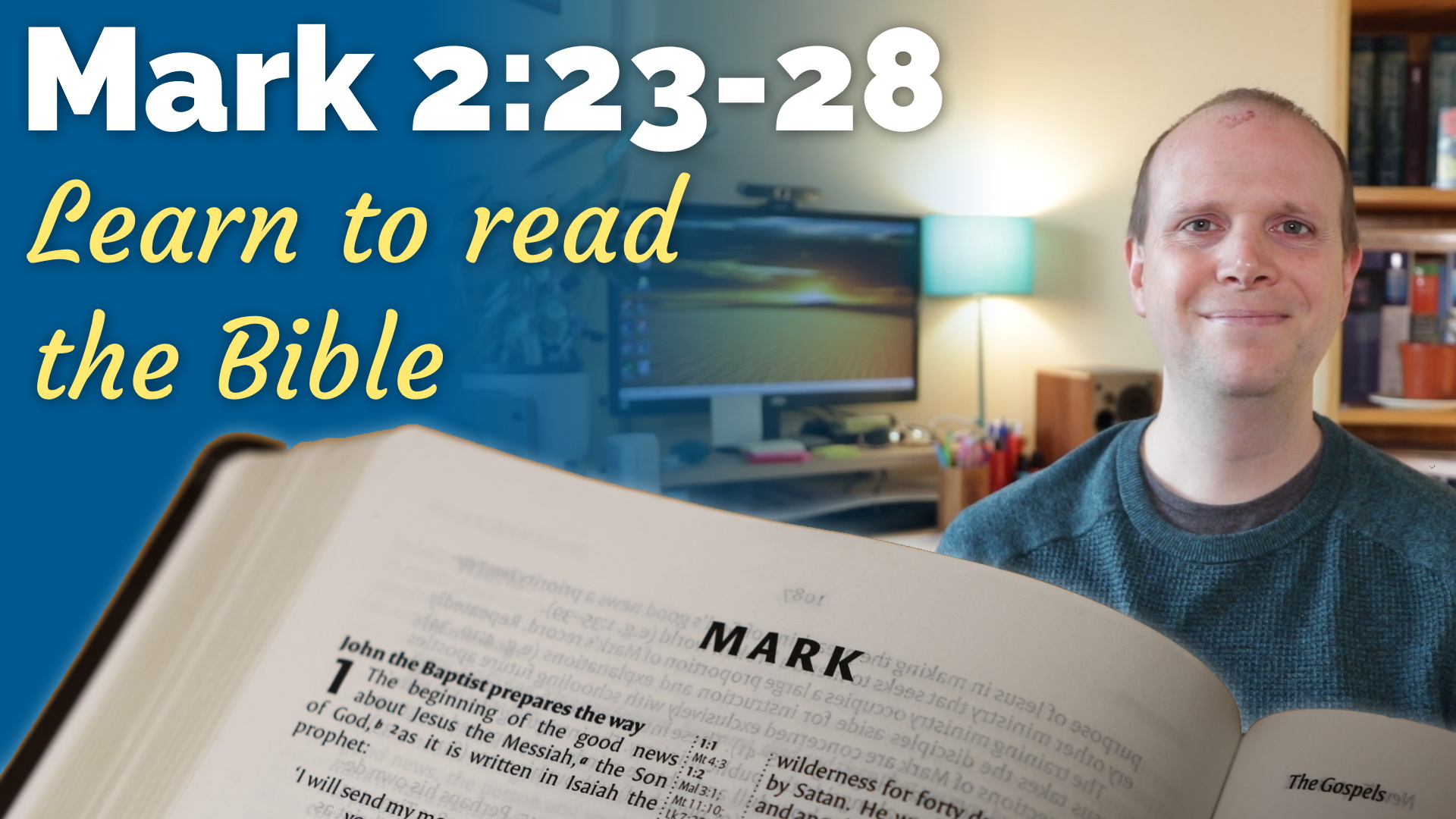In the fourth commandment we are told to keep the Sabbath day holy. But what does that mean? Is Sunday the new Sabbath for Christians? How do we obey this commandment today?
See more courses on the courses page.

In the fourth commandment we are told to keep the Sabbath day holy. But what does that mean? Is Sunday the new Sabbath for Christians? How do we obey this commandment today?
See more courses on the courses page.


One of the things which has cropped up several times over the last few weeks is thinking about the Sabbath. Before Christmas, my wife’s book group read The Ruthless Elimination of Hurry by John Mark Comer. Then I listened to an episode of the Cooper & Cary podcast about Sabbath. All this has got me thinking about the Sabbath commandment.
It’s a command that I’ve always struggled with a bit. When I was younger, the chief thing I remember about Sundays is that I wasn’t allowed to watch TV like normal! We went to church in the morning and the evening, and I would often play with a friend in the afternoon. It certainly felt like a different kind of a day. But is that right? What does the Bible say? And how should Christians think about the Sabbath?
It’s a big question and I don’t pretend to have all the answers here! There’s a session in the Heidelberg Catechism on the Sabbath Day, and there I link to a helpful article by John Piper, you might like to have a look at those as well. But let’s dive in and see what we can learn from the commandment first of all.
Remember the Sabbath day by keeping it holy. Six days you shall labour and do all your work, but the seventh day is a sabbath to the Lord your God. On it you shall not do any work, neither you, nor your son or daughter, nor your male or female servant, nor your animals, nor any foreigner residing in your towns. For in six days the Lord made the heavens and the earth, the sea, and all that is in them, but he rested on the seventh day. Therefore the Lord blessed the Sabbath day and made it holy.
Exodus 20:8-11
The Ten Commandments are repeated in Deuteronomy (shortly before the Israelites enter the Promised Land). Interestingly, the commandment there is slightly different. Instead of “For in six days…”, it finishes:
Remember that you were slaves in Egypt and that the Lord your God brought you out of there with a mighty hand and an outstretched arm. Therefore the Lord your God has commanded you to observe the Sabbath day.
Deuteronomy 5:15
Let’s think about a few basic principles which we can draw from this.
The first principle is the clear pattern of ‘one day a week’. Work for six days, then have a day of rest. In the Cooper & Cary podcast I mentioned above, they talked about a fascinating article from someone who tried working a seven-day work week. He tried working the same pattern every day, seven days a week, and just tried to build enough rest into each day so he could manage it. It just didn’t work out in the end:
Overall, I feel like the 7-day work week failed because of lack of an extended period of renewal. My hypothesis – that a couple of extra hours during the day and fewer overall daily hours working would be enough – was invalidated in my experience.
It does seem like there is something built into our nature that means we need to take a day off per week. We human beings cannot work continually, even if we have rest time during each day. We need rest. Everyone needs daily time to sleep, along with occasional longer breaks, and we need the weekly rhythm of a day off.
One of the things it would be easy to miss about the commandment is that it’s given to the whole community – “you, your son or daughter, your servant”, etc. In other words, it’s not simply an individualistic ideal but something which is for the whole people of God. This is why Christians have traditionally met together in church on a Sunday (more on that in a minute). Sabbath is not simply a private, individual activity but something which the whole community should get involved with.
This is important for 21st Century Westerners to understand: we live in a world where everything is very individualistic. We live our own private lives, and meeting other people is something which happens almost as an optional extra – something which is an addition to our lives. By contrast, the Bible puts community front and centre. We are individuals, yes, but we are saved as part of a bigger family – the people of God, the church. Sabbath doesn’t involve just us but the whole people of God.

One of the most intriguing things to me about the Sabbath commandment is the last line (from Exodus 20) – “For in six days the Lord made the heavens and the earth…” So there is a pattern, built into the very fabric of creation itself: God made everything in six days, then rested (Genesis 2:2-3).
Rest is actually a very important concept in the Bible. It’s more than simply ‘putting your feet up’. It’s more like a state of mind, or being. Think about the seventh day when God rested: when did that day end? There’s no “and there was evening, and there was morning” to finish the day. It’s almost as if the seventh day continued indefinitely – and still continues today. Is God resting still? I think Genesis leaves that question wide open, intentionally.
So what does ‘rest’ mean? Let’s turn to Revelation 14:13, which says:
“Then I heard a voice from heaven say, ‘Write this: blessed are the dead who die in the Lord from now on.’ ‘Yes,’ says the Spirit, ‘they will rest from their labour, for their deeds will follow them.’”
Rest here is something that Christians enter into when they die. They will rest from their “labour”. I don’t believe this is something a simple as the earthly work that we do. It’s more fundamental than that: it’s the work that we do in order to earn favour with God. We human beings naturally think that we need to work – to do good deeds – to earn favour with God. This is how human life is set up: if you don’t work, you don’t earn; if you don’t earn, you don’t eat. (As a general rule – let’s ignore the question of the welfare state for now!)
So rest is not putting your feet up: it’s more fundamental than that. It means trusting in God’s grace: trusting that our deeds can never be enough to earn favour with God, and trusting that he alone is the one who provides our spiritual and physical needs. Sabbath, therefore, is about letting go of our own efforts to earn and trusting in God’s grace. I think this is why the second version of the commandment (from Deuteronomy) talks about bringing the Israelites out of Egypt: it wasn’t something they earned or did by their own efforts! God brought them out by his grace.
The Sabbath rest is designed to teach us that our works are not enough, but that God’s grace is enough. Therefore is it not about stopping working as such, but about not earning.
The final Sabbath principle we’ll think about is that the Sabbath should be ‘kept holy’. What does that mean? ‘Holy’ is a word that describes God. It’s hard to define concisely – it means God in his perfection, splendour, righteousness, justice, etc. God is the ‘most most-est‘. When we say he is holy we are saying he is perfect love, perfect light, everything good and perfect is contained within him.
So what does it mean to keep the Sabbath holy? Partly it means resting, as we looked at in the previous section. But I believe it includes more than that: it includes things like worshipping God together, learning from the Bible, and so on. Doing activities which are more explicitly ‘Christian’, if you like.
This is another reason why traditionally Christians have gone to church on a Sunday: it is the day set aside for corporate worship, when the whole church comes together. Personally I couldn’t imagine a Sunday without meeting as a church – it’s such an ingrained part of my life now! This doesn’t mean we can’t have church on other days, but rather that there is something special when the whole church meets together on the Lord’s Day.

The Eagle-eyed among you may have spotted that the Sabbath pattern is to work for six days, then rest. If Sunday is the first day of the week, then this would mean the Sabbath day was a Saturday – as it was for the Old Testament people of Israel, and continues to be for Jewish people today. Why did the early church decide to change this day to a Sunday? Are we being disobedient to God by having Sabbath on a Sunday instead of a Saturday?
I don’t believe so. Early Christians changed the day of the Sabbath because Sunday was the day the Lord Jesus rose from the dead (all four gospels make clear that Jesus was risen on the first day of the week). Sunday is the day we celebrate the resurrection, when we can celebrate entering into the rest which God has promised us.
One of the things I like about the Sabbath commandment is that it’s actually quite open-ended. It doesn’t specify you must do this or that. Even the commandment not to work doesn’t actually say what that actually means. For example, in some jobs such as farming there are things which have to be done each day. You can’t stop feeding animals on the Sabbath – that would be a cruel thing to do!
In a dispute about what was lawful to do on the Sabbath, Jesus said: “The Sabbath was made for man, not man for the Sabbath. So the Son of Man is Lord even of the Sabbath.” Jesus said that the Sabbath is made for us and our benefit. It’s not some arbitrary rule which we need to keep just because God doesn’t like us to have fun on one day! It’s supposed to be something which is beneficial and enjoyable for us.
So I think obsessing about what is and is not permissible on the Sabbath day misses the point. It’s up to our own conscience and situation to decide what is and is not appropriate for us. I don’t think a rule-based approach is really helpful.
I would say as a rule of thumb the following might be helpful:
Do you have any more insights about Sabbath? Have you found anything particularly helpful? Are there things you can recommend? Let us know in the comments below!

I’ve just published the ninth part of the Learn to read the Bible series on Mark’s Gospel. This week we are looking at Mark 2:23-28, when Jesus is questioned about the Sabbath.
For those who are coming to this new, the idea behind this series is not for me to simply explain everything to you, but rather to give you things to think about yourself. This is about training you to read the Bible for yourself, rather than just giving you all the answers!
See this page if you’d like a few pointers for how to use these videos. Don’t forget to pray!
You can read the passage online here (although I’d suggest it’s better in a physical Bible). You may also want to have a pen and paper handy to jot down notes and things you want to look into more.
You can see the rest of the videos in this series on the this page. If you’d like a more focussed series teaching the Christian faith, check out the teaching programme.
You might also want to see the previous episode in the series on Mark 2:18-22.
